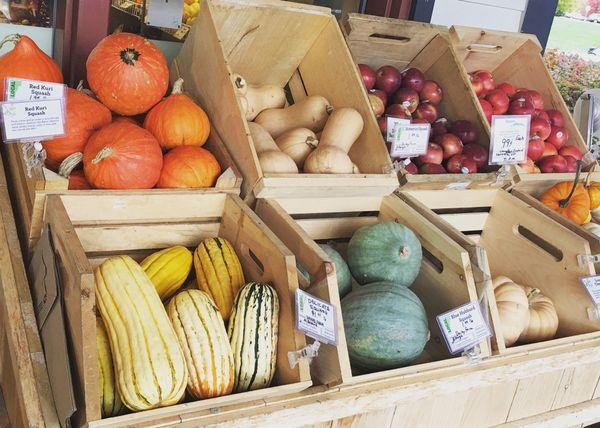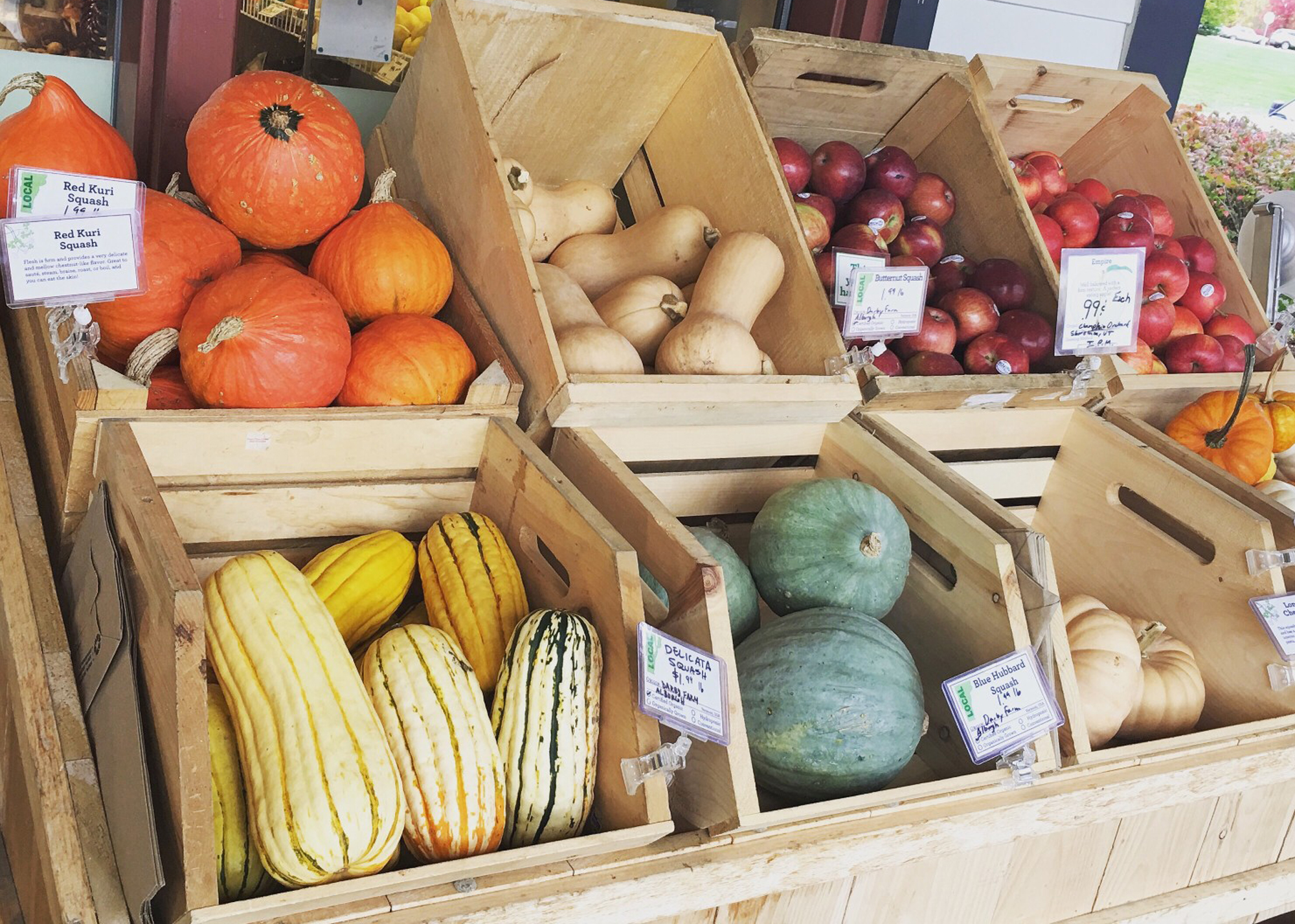Pumpkins, squash and gourds are all members of the same family, scientifically known as Cucurbitaceae.1 Is squash healthy? You bet! They come in many different varieties that provide a host of nutritional benefits. The health benefits of squash range from boosting your immune system and eyesight to guarding against inflammation. Read on to learn more about some of the healthiest types of squash and gourds you’ll find in supermarkets.
Acorn Squash is Good for You
Acorn Squash is a winter squash that deserves a place on your plate for a few very good reasons. It has an aromatic, slightly nutty flavor. It’s absolutely delicious roasted, and it is loaded with antioxidants, like carotenoids, which are known to help prevent and fight certain diseases.2 Acorn squash is also a great source of immunity-boosting vitamin C, and it is rich in potassium, which helps maintain healthy blood pressure.3
Yellow Squash Nutritional Benefits
Yellow squash, also known as summer squash, packs a serious nutritional punch. It's one of the healthiest squash available! Yellow squash contains vitamin A, vitamin C, vitamin B6, folate, magnesium, fiber, riboflavin, phosphorus, potassium and more. Yellow squash also contains manganese, a mineral that helps boost bone strength and helps your body process fat and carbs.4
Zucchini Benefits
Zucchini is another type of summer squash that is very good for you. Zucchini is low in calories, carbohydrates and sugars but high in nutrients and immune-system boosting antioxidants. It contains potassium, manganese, vitamin A and vitamin C, and because of its mild flavor, it can be used in a lot of different recipes. Try it raw with veggie dip, steamed as a side dish or added to stir fry, or try zucchini baked along with tomatoes and other vegetables for a healthy vegetarian dish.
Benefits of Bitter Gourd
Also known as bitter melon or bitter squash, this unusual looking member of the gourd family has been used in traditional medicines since ancient times.5 Modern studies have shown it may be useful for regulating blood sugar, as an antibacterial and antiviral agent and to help lower cholesterol.6 But the many benefits of bitter gourd don’t stop there. Bitter gourd is full of antioxidants and nutrients like vitamin A, vitamin C, biotin and zinc.
As the name suggests, bitter gourd has a bitter flavor, so it’s often juiced, pickled or added to recipes with other ingredients. If the bitterness is unwelcoming, it’s also available in our Full Spectrum Bitter Melon supplement.
Butternut Squash Nutrition
A single serving of butternut squash packs in 457% of the recommended daily value of vitamin A, and it is high in vitamin C, potassium, magnesium, vitamin E and vitamin B-6. Butternut squash is also low in calories and high in antioxidants, making it a guilt-free addition to your menu. Try it in butternut squash soup to warm up on chilly days, and if you aren’t up for the prep-work involved in handling these large gourds, try our canned Organic Butternut Squash.
Pumpkins Rich in Fiber
Set aside the pumpkin spice latte for the real deal. Fiber-rich pumpkin is full of beta-carotene that your body converts to vitamin A, which makes it great for eye health. It also contains a healthy serving of antioxidants, like lutein and zeaxanthin, and plenty of immunity-boosting vitamin C. According to scientific tests, pumpkin may also reduce blood glucose levels, boost your body’s tolerance for glucose and increase insulin production.7
For pumpkin recipes, check out: High Fiber Pumpkin Bars and Pumpkin: 14 Recipes Prove It's More than Just a Latte Flavor. If you need to satisfy your pumpkin spice craving try our recipe for Pumpkin Spice Cupcakes with Cream Cheese Frosting.
Healthy Spaghetti Squash
Skip the carb-heavy pasta and try lower-calorie spaghetti squash as a substitute. Spaghetti squash gets its name from the long strands that form when you scrape its baked flesh with a fork. You can top it with anything you would typically add to spaghetti, like marinara sauce, pesto, cooked veggies, meats or cheeses.
Spaghetti squash contains antioxidant vitamins like vitamin A, vitamin C and carotenes, and it offers B-complex vitamins like niacin, vitamin B-6 and folates.8
Looking for more natural health tips? Sign up for Swanson Health emails to get coupons and insider tips delivered straight to your inbox.

About Lindsey Toth, MS, RD
Registered Dietitian, Swanson Health Products
Lindsey is a nationally recognized registered dietitian and nutritionist with a soft spot for ice cream. She empowers people to take charge of their health by finding the balance between the pleasure and nourishment in food.
Her philosophy is that you should take care of your body because it’s the only permanent home you have. It’s what inspired her to pursue a career in nutrition and, ultimately, led her to Swanson Health Products.
Sources
1 List of Plants in the Family Cucurbitaceae: Encyclopedia Britannica. https://www.britannica.com/topic/list-of-plants-in-the-family-Cucurbitaceae-2038063 (Accessed 10/30/2017)
2 How Carotenoids Help Protect Against Cancer: Physician’s Committee for Responsible Medicine https://www.pcrm.org/health/cancer-resources/diet-cancer/nutrition/how-carotenoids-help-protect-against-cancer (Accessed 10/24/2017)
3 Effects of sodium and potassium supplementation on blood pressure and arterial stiffness: a fully controlled dietary intervention study.: PubMed. https://www.ncbi.nlm.nih.gov/pubmed/25673113 (Accessed 10/24/2017)
4 Full Report (All Nutrients): 11467, Squash, summer, crookneck and straightneck, raw: United States Department of Agriculture. https://ndb.nal.usda.gov/ndb/foods/show/3173?n1=%7BQv%3D1%7D&fgcd=&man=&lfacet=&count=&max=&sort=&qlookup=&offset=&format=Full&new=&measureby=&Qv=1&ds=&qt=&qp=&qa=&qn=&q=&ing= (Accessed 10/30/2017)
5 Pharmacological actions and potential uses of Momordica charantia: a review: Science Direct. http://www.sciencedirect.com/science/article/pii/S037887410400159X?via%3Dihub (Accessed 10/24/2017)
6 Antidiabetic effects of Momordica charantia (bitter melon) and its medicinal potency: US National Library of Medicine National Institutes of Health. https://www.ncbi.nlm.nih.gov/pmc/articles/PMC4027280/ (Accessed 10/24/2017)
7 Surprising Health Benefits of Pumpkin: WebMD https://www.webmd.com/food-recipes/features/6-surprising-health-benefits-of-pumpkin (Accessed 10/24/2017)
8 Nutrient Report on Spaghetti Squash: United States Department of Agriculture https://ndb.nal.usda.gov/ndb/foods/show/3195?manu=&fgcd=&ds=Standard%20Reference (Accessed 10/24/2017)
*These statements have not been evaluated by the Food and Drug Administration. These products are not intended to diagnose, treat, cure or prevent any disease.




